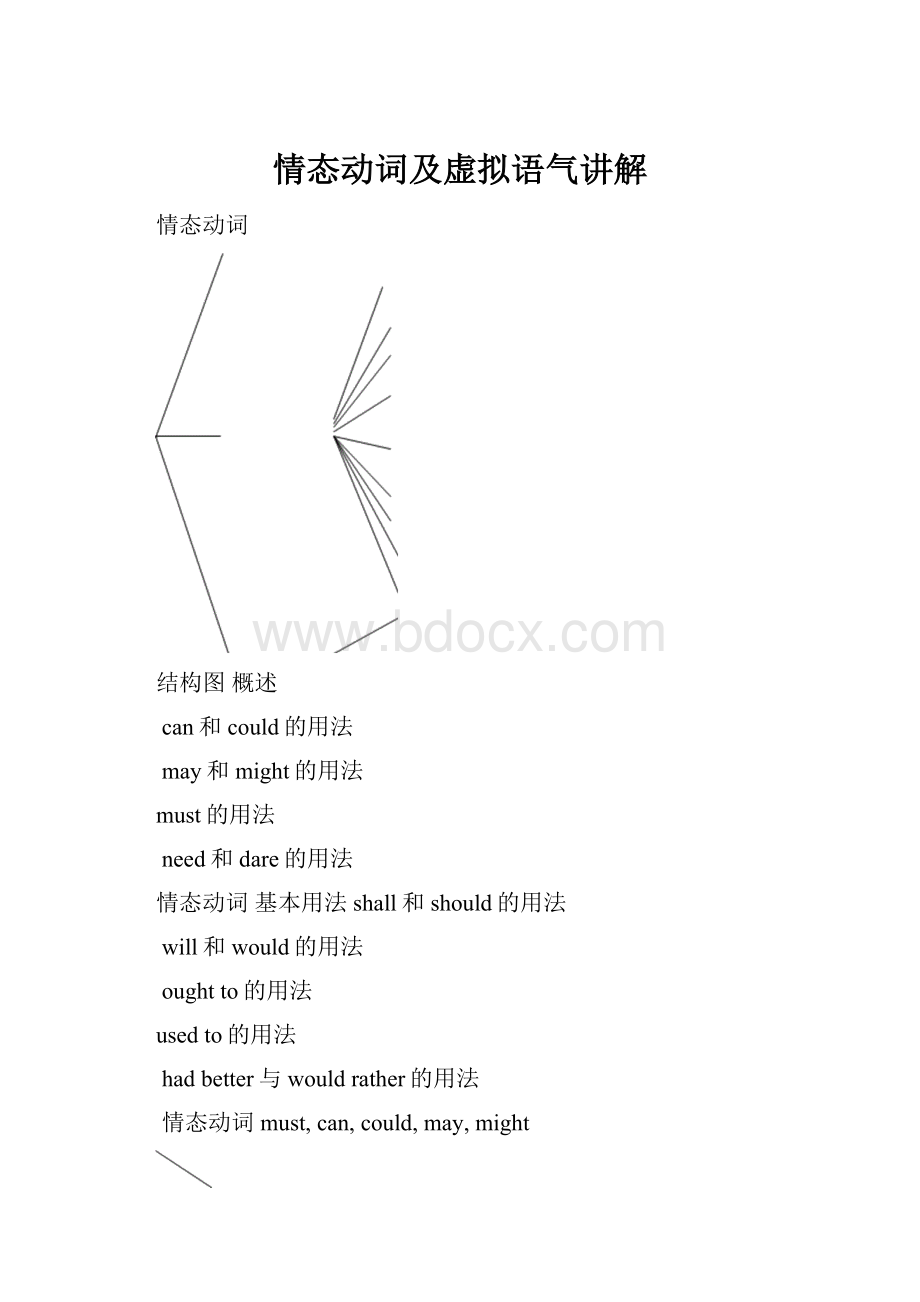情态动词及虚拟语气讲解.docx
《情态动词及虚拟语气讲解.docx》由会员分享,可在线阅读,更多相关《情态动词及虚拟语气讲解.docx(14页珍藏版)》请在冰豆网上搜索。

情态动词及虚拟语气讲解
情态动词
结构图概述
can和could的用法
may和might的用法
must的用法
need和dare的用法
情态动词基本用法shall和should的用法
will和would的用法
oughtto的用法
usedto的用法
hadbetter与wouldrather的用法
情态动词must,can,could,may,might
其它用法表推测的用法
“情态动词+have+done”结构的含义及用法
一、概述:
情态动词有:
can(could),may(might),must(must),haveto,shall(should),will(would),need(need),dare(dared),oughtto.情态动词无人称和数的变化,不能独立使用.它与其后边的动词原形一起构成谓语.情态动词的具体用法如下:
二、情态动词的用法:
(一)can和could的用法
l.注意can和could的一般疑问句的回答(could用在疑问句中比can语气更委婉)。
如:
Canyoufinishthisworktonight?
---Yes,Ican./No,Ican't.
Couldyouhelpme---Sure./Certainly./OK.?
Ofcourse.或Yes,Ican./No(或Sorry),I’mafraidnot.
2.can和could表示推测(见后面)。
3.can与beableto的区别:
①can常常指某人具备某种知识或技能,而beableto则指具体做某件事的能力。
如:
Icanread,butIamnotabletoreadthispassage.
②can常常只有现在或过去两种形式,而beableto可以有多种形式,可以用于多种时态。
如:
Jimcanreadandwritenow,buthecouldn’tdoitwhenhewasfouryearsold.
Atthattimehewasabletoanswerthequestion,nowheisabletoanswerthequestiontoo.Ofcoursehewillbeabletoanswersuchquestioneasilyinthefuture.
(二)may和might的用法
1.注意may与might的一般疑问句的回答(might用在疑问句中比may语气更委婉)。
用MayI…征询对方许可在文体上比较正式,在口气上比较客气。
在日常口语中,用CanI…征询对方意见在现代口语中更为常见。
如:
May/MightIaskyousomequestions?
---Yes,youmay./Yes,youcan./Yes,youmust./Yes,please.
---No,youmaynot.(一般不常用)/No,youcan't./No,youmustn't./No,you'dbetternot.
2.may和might表示推测(见后面)。
3.用于祈使句中表示祝愿.例如:
Mayyousucceed!
(三)must的用法:
1.注意must的一般疑问句的回答:
MustIgothereatonce?
---Yes,youmust./No,youneedn't.=No,youdon’thaveto.
2.must表示推测(见后面)。
3.must与haveto的区别:
① must只有一种形式,而haveto有各种形式和时态,随have的变化而定。
②must表示的是说话人的主观看法,而haveto则往往强调客观需要.例如:
Theplayisnotinteresting.Ireallymustgonow.Ihavemissedthebus,soIhavetowalkhome.IhadtoworkwhenIwasyourage.
(四)need和dare的用法
1.作情态动词:
need表示“需要”或“必须”,仅用于否定句或疑问句中,在肯定句中一般用must,haveto,oughtto,或should代替(注意其一般疑问句的回答方式与must完全一样);dare主要用于疑问句、否定句和条件状语从句中,一般不用于肯定句。
例如:
Youneedn’tcomesoearly.
NeedIfinishherworktoday?
---Yes,youmust./No,youneedn't.=No,youdon’thaveto.
Darehedoit?
---No,hedaren’t.HowdareyousayI’munfair.Ifyoudarecomehere,Iwillcometomeetyou.Hedaren’tspeakEnglishbeforesuchacrowd,darehe?
---Yes,hedare./No,hedaren’t.
注意:
needn’thavedone“表示本来不必做某事而实际上却做了某事”。
例如:
Youneedn’thavewaitedforme.
2.作实义动词:
dare和need后面接不定式(todo),有人称、数和时态的变化,变否定句和疑问句时要借助于助动词。
所不同的是,作实义动词时,在肯定句中,dare后面通常接带to的不定式;而在否定和疑问句中,dare后面的不定式可以不带to.例如:
Idaretoswimacrossthisriver. Hedoesnotdare(to)answer. Don’tyoudare(to)touchit!
Iwonderedhedare(to)saythat. Doeshedaretogothere?
---Yes,hedoes./No,hedoesn’t.Heneedstofinishitthisevening. Hedoesn’tneedtofinishitthisevening.Doesheneedtofinishitthisevening?
---Yes,hedoes./No,hedoesn’t.
(五)shall和should的用法 。
1.Shall的用法:
①shall用于第一人称的肯定句表示将来,用于第一人称的特殊疑问句表示征求对方的意愿.例如:
IshallgotoBeijingtomorrow.Whatshallwedothisevening?
②shall用于第一、第三人称疑问句中、表示说话人征求对方的意见或向对方提出请示。
例如:
Shallwebeginourlesson?
Whenshallhebeabletoleavethehospital?
③shall用于第二、三人称的肯定句中,表示说话人给对方的命令、警告、允诺或威肋.例如:
Youshallfailifyoudon’tworkharder.(警告)HeshallhavethebookwhenIfinishreading.(允诺)
Heshallbepunished.(威胁)
2.should的用法:
①should的用法:
a.should表示劝告、建议、命令,其同义词是oughtto.如:
Youshouldgotoclassrightaway.ShouldIopenthewindow?
b.should可以用在if引导的条件从句中,表示一件事听起来可能性很小,但也不是完全没有可能。
相当于“万一”的意思。
从句谓语由should加动词原形构成,主句谓语却不一定用虚拟语气。
例如:
Askhertoringmeupifyoushouldseeher.你万一见到她,请让她绘我打个电话。
Ifyoushouldchangeyourmind,pleaseletusknow.万一你改变主意,请通知我们。
ShouldI(ifIshould)befreetomorrowIwillcome.万一我明天有时间,我就来。
c.“Why/Howshould…?
”结构表示说话人对某事不能理解,感到意外、惊异等意思。
意为“竟会”。
例如:
Whyshouldyoubesolatetoday?
你今天怎么来得这么晚?
WhereisBettyliving?
一HowIshouldknow?
-贝蒂住在哪里?
-我怎么会知道呢?
Idon’tknowwhyyoushouldthinkthatIdidit.我真不知道你凭什么认为这件事是我干的。
d.“shouldhavedone”表示本应该做到而实际上没有做到. Youshouldhavestartedearlier.
②oughtto的用法:
a.oughtto也表示“应该”,注意其肯定句、否定句、一般疑问句及回答。
Yououghttoobeythelaw.---Yououghtn'ttoobeythelaw.Oughtyoutoobeythelaw?
----Yes,Ioughtto./No,Ioughtn'tto.
b.“oughttohavedone”表示(按规则)过去应做某事而实际未做.例如:
Yououghttohavehelpedhim(butyoudidn’t).
这时,oughtto与should可以互相换用.
注意,在美国英语中,oughtto用于否定和疑问句时,to可以省略.例如:
Oughtyousmokesomuch?
Yououghtn’tsmokesomuch.
③should与oughtto的区别。
should侧重表示道德上理应如此,而oughtto侧重表示在规则、条例或法律上应该如此。
如:
Youshouldgotoclassrightaway.Accordingtothelawyououghttoobeytherules.
(六)will和would的用法
1.will的用法:
①will表示请求、建议等。
例如:
Will/Wouldyoupassmethebook?
②表示意志、愿望和决心。
例如:
Iwillneverdothatagain.Theyaskedasifwewoulddothatagain.
2.would的用法:
①would是will的过去式。
注意其两种固定问句的回答方式。
Wouldyoulike…?
----Yes,please./No,thanks.
Wouldyouliketodo…?
----Yes,I'dloveto./I'dloveto,but…./I'msorryIcan't.
②would与usedto的区别:
would表示过去反复发生的动作,没有“现已无此习惯”的含义;而usedto表示过去反复发生的动作或某种倾向,有“现已无此习惯”的含义。
例如:
Heusedtocomehereearly,butnowhedoesn’tdoit.Hesaidhewouldwritemanynovelswhenhewasyoung.Heusedtobeateacher,butnowheisn’t.
3.will与would的区别:
would比will委婉客气;用“willbe”和“willhavedone”结构表示推测,主要用于第二、三人称,前者表示对目前情况的推测,后者表示对已经完成的动作或事态的推测;而“wouldbe”和wouldhavedone表示料想或猜想.例如:
Thiswillbethebookyouwant.
Hewillhavearrivedbynow.
Itwouldbeabouttenwhenhelefthome.
Whatwouldshebedoingthere?
Ithoughthewouldhavetoldyouallaboutit.
(七)oughtto的用法
1.oughtto也表示“应该”,注意其肯定句、否定句、一般疑问句及回答。
Yououghttoobeythelaw.---Yououghtn'ttoobeythelaw.Oughtyoutoobeythelaw?
---Yes,Ioughtto./No,Ioughtn'tto.
2.“oughttohavedone”表示(按规则)过去应做某事而实际未做.例如:
Yououghttohavehelpedhim(butyoudidn’t).
这时,oughtto与should可以互相换用.
注意,在美国英语中,oughtto用于否定和疑问句时,to可以省略.例如:
Oughtyousmokesomuch?
Yououghtn’tsmokesomuch.
(八)usedto的用法
usedto表示过去的习惯动作或状态,现在已不存在(woulddo只能表示过去习惯性的动作而不能表示过去的状态,并且这种动作现在也可能存在),在间接引语中,其形式可不变。
注意在疑问句、否定句、否定疑问句或强调句中,可有两种式。
例如
Hetoldusheusedtoplayfootballwhenhewasyoung.
疑问句
Didyouusetogotothesameschoolasyourbrother?
Usedyoutogotothesameschoolasyourbrother?
否定句
Iusedn’ttogothere.
Ididn’tusetogothere.
usedn't亦可拼作usen't,但发音皆为[ju:
znt].
否定疑问句
Usen’tyoutobeinterestedinthetheatre?
Didn’tyouusetobeinterestedinthetheatre?
强调句
Icertainlyusedtosmoke,butitwasalongtimeago
Icertainlydidusetosmoke,butitwasalongtimeago
其反意疑问句或简略回答中,也有两种形式:
Sheusedtobeveryfat,didn’tshe?
/use(d)n’tshe?
Didyouusetoplaychess?
Yes,Idid.
Usedyoutogetupearlyinthemorning?
Yes,Idid./Yes,Iusedto.
(九)hadbetter与wouldrather的用法:
1.hadbetter意为“最好”,后接不带to的不定式。
例如:
-Wehadbettergonow.
-Yes,wehad(we'dbetter/webetterhad?
)
Hadn’twebetterstopnow?
(Hadwebetternotstopnow?
)
IthinkI’dbetterbegoing.(用于进行时态,表“最好立即”)
Youhadbetterhavedonethat.(用于完成时态,表未完成动作)
注:
①hadbest与hadbetter同意,但较少用。
②Youhadbetter…用于同辈或小辈,对长辈不可用.
2.wouldrather意为“宁愿”,表选择,后接不带to的不定式。
例如:
I’drathernotsayanything.Wouldyouratherworkonafarm?
-Wouldn’tyouratherstayhere?
-No,Iwouldnot,I'drathergothere.
由于wouldrather表选择,因而后面可接than.例如:
Iwouldratherworkonafarmthaninafactory.
IwouldratherwatchTVthangotoseethefilm.
Iwouldratherloseadozencherrytreesthanthatyoushouldtellmeonelie.
I’dratheryoudidn’ttalkaboutthistoanyone.(句中的’drather不是情态动词,would在此是表愿望的实义动词)。
附:
情态动词表示推测及“情态动词+have+done”结构分析
一、情态动词must,can,could,may,might表推测的用法:
情态动词中的must,can,could,may,might都表推测。
其中must的可能性最大,can/could次之,may/might最小。
具体用法如下:
1.它们出现的句型不同:
must常用于肯定句中表推测,can常用于否定句和疑问句中表推测(也可以用于肯定句中,但不常见),could常用于肯定句、否定句和疑问句中表示推测;may/might常用于肯定句和否定句中表推测(might表推测时比may的可能性更小)。
如:
Hemustbeateacher.---Hecan'tbeateacher./Canhebeateacher?
Theweathercanbequitewarminwinter.Theplanecouldbedelayedbyfog.Itcouldn’tpossiblybepoison.Hemay/mightbeateacher.---Hemay/mightnotbeateacher./Canhebeateacher?
YoumusthavebeentoShanghai.Ifyoucomehereearlieryesterday,youcouldhavemethim.Hecan't/couldn'thavebeentothetown.Canhehavebeentothetown?
Wherecan(could)theyhavegone?
Hemay/mighthavefinishedthework.Hemay/mightnothavefinishedthework.
2.有两种不同的推测形式:
“can/could/may/might/must+be”表示对现在情况的推测,而“can/could,may/might,must+havedone”则表示对过去的推测。
mustbe为“肯定是,一定是”,can't/couldn'tbe为“不可能是”,may/mightbe为“可能是”,may/mightnotbe为“可能不是”;musthavedone“肯定是做过……”,can/couldnothavedone“不可能已经做过……”,may/mighthavedone“可能已经做过……”,may/mightnothavedone“可能没有做过……”。
例子见上面。
3.注意变反义疑问句:
如果它们后面接be,表示对现在的推测,变反义疑问句时,应将其当成be动词一般现在时态看待。
如:
Hemustbeateacher,isn'the?
Hecan'tbeateacher,ishe?
Hemaybeateacher,isn'the?
Hemaynotbeateacher,ishe?
如果它们后面接havedone,表示对过去的推测,变反义疑问句时:
如果句中有了表示过去的具体的时间状语,应将句子当作实义动词的一般过去时态看待;如果句中没有具体的时间状语,应将句子当作现在完成时态看待。
如:
Lucymusthavegonethereyesterday,didn'tshe?
Hemusthavefinishedhishomework,hasn'the?
下面这些短语不具有推测含义:
couldhavedone“本来能够做……而没有做”,oughttohavedone“本来应该做……而没有做”(表示从客观法律、义务或规则上看应该做……而没能做到),shouldhavedone“本来应该做……而没有做”(表示从主观上看应该做……而没能做到),needn'thavedone“本来不需要做……而已经做了”。
如:
Wecouldhavecomehereanhourearlier.Yououghttohavefinishedyourhomework.Youneedn'thavecomehereearly.
4.注意:
①must表示推测时很少用于将来的情况。
一般不用Hemustcometomorrow.可用It’scertain/I’msurethathewillcometomorrow.
②may,might可以推测将来的情况。
如:
Ithinkweshouldtakeraincoatwithus,itmayrain.
我想我们应该带上雨衣,可能要下雨了。
Shemightnotcomethisafternoon.她今天下午可能不来了。
二、“情态动词+have+done”结构的含义及用法
1、shouldhavedone/shouldnothavedone
它们分别表示“过去本来应该(已经)…(而实际上并没有…)”/“过去本不应该(已经)…而实际上却已经…”如:
Weshould